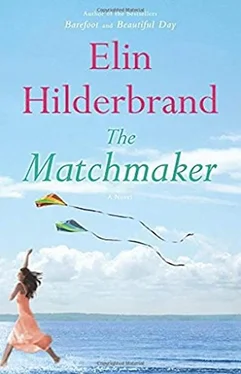Dabney tucked herself under Clen’s right arm, and he felt her smile against his chest. She had eaten next to nothing, but neither Clen nor Agnes had nudged her about it because it did no good. Dabney ate when she was hungry, which was about once every three days. That she had outdone herself was right. Clen knew that this was the last meal she would ever cook.
There was, no doubt, an elaborate and scrumptious dessert waiting somewhere within the confines of the Joneses’ enormous SubZero refrigerator, but none of them would partake in it tonight. Dabney fell fast asleep against Clen’s chest. Agnes and Riley rose to silently do the dishes while Clen sat and enjoyed the dying embers of the fire before carrying the ninety-six pounds of Dabney Kimball back to his cottage to bed.
Stop time, he prayed. Now. Stop it now.
There was something she wanted, but she couldn’t bring herself to ask for it.
By the end of October, her mother was in a wheelchair. She slept all the time now, and, at her request, she was staying at Clen’s cottage. Dabney weighed almost nothing. She was so thin, it was as though a part of her had been erased.
Agnes didn’t know what to do. She talked to Riley every night on the phone. Her mother was going to die. Christmas Stroll didn’t seem like a realistic goal. Agnes was going to have to call hospice, and soon.
November 6 was Dabney’s birthday. She was forty-nine.
He asked her what she wanted to do to celebrate, and she said that she wanted to order Cuban sandwiches from Foods for Here and There, and she wanted to watch Love Story with Clen and Agnes.
“No cake?” he said. Dabney liked proper pomp and circumstance when it came to birthdays: cake, candles, cards, and presents. That had been true when she was a teenager, and he’d assumed it still was.
Dabney shook her head. Just the sandwiches and the movie, she said.
He said, “Don’t you think Love Story might be too…maudlin?”
“It’s my favorite movie,” she said. “I’d like to see it one more time.”
Agnes arrived at his cottage, looking very, very sad. She and Clen had decided that afternoon to call hospice. They would let Dabney enjoy her birthday, and then hospice would come every day for as long as they were needed.
Dabney would not live to see fifty.
Before the sandwiches and the movie, Clen decided to give Dabney her surprise. She held it in her lap and turned it over, admiring the plaid wrapping paper in navy blue, Nantucket red, and Kelly green.
“I love this wrapping paper,” she said. “I wish every present I’d ever gotten had been wrapped in this paper.”
A good start, he thought. Agnes had picked out the paper.
Dabney touched the present some more, fingering its edges. Taking her time with the last present she would likely ever open.
“I think it’s a book!” she said.
“Open it, Mommy,” Agnes said.
Dabney opened it. The cover of the book was pink, a dusty-rose blush. And in black letters on the front it said, THE MATCHMAKER: DABNEY KIMBALL BEECH.
“Oh,” Dabney said.
She turned to the first page. Couple #1: Ginger (née O’Brien) and Phil Bruschelli, Married twenty-nine years. Ginger: It would have been presumptuous of me to call myself Dabney’s best friend, because even in 1981, freshman year, Dabney was the most popular girl in the school.
And so on and so on-through Tammy Block and Flynn Sheehan, and Dr. Donegal, and the Levinsons, and Genevieve and Brian Lefebvre, and the failed story of Nina Mobley. Clen had managed to collect nineteen of the forty-two stories. He had done the interviews, and had edited each story to make it readable.
Dabney paged through the book, laughing and cooing, and saying, Yes, yes, I remember that! When she looked up at Clen, her eyes were shining with tears.
“I can’t believe you did this,” she said. “This is the most wonderful thing anyone has ever given me.”
“You have brought so much love into the world, Mommy,” Agnes said.
Clen said, “I thought it was important. Agnes will keep it. Her children will read it. And their children. They will know you through those stories.”
Dabney blinked. Tears dropped onto the pages. “Thank you,” she whispered.
There was something she wanted. She was afraid to ask for it. Forbearance, she thought. She was running out of time.
It was the middle of the night, three or four in the morning, her birthday officially over. The present of the book had overwhelmed her. It was a living history, her life story really, that her grandchildren and great-grandchildren would read. They might think of her the way she thought about Dabney Margaret Wright and Winford Dabney Wright and all the other women who had preceded her. She was merely taking her place in line.
The Cuban sandwich had been delicious, and Love Story had been okay until the scene where Oliver tells his father that Jenny has died.
“Turn it off,” Dabney had said.
“Are you sure?” Clen said.
“Yes.” Dabney knew what was coming, and she couldn’t handle the sight of Oliver sitting alone in the snow.
Dying wasn’t sad, she thought. Leaving people behind was sad.
There was something she wanted. It was exactly 3:44 in the morning. Dabney slept much of the day away, but in the very late hours, so late they were early, sleep often eluded her. Forbearance. Her great-grandmother, Winford Dabney Wright, had stood on the corner of Main and Federal Streets eight hours a day for six weeks petitioning for a woman’s right to vote, talking and arguing with anyone who would listen. Dabney’s beloved grandmother, Agnes Bernadette, had changed sheets and scrubbed toilets six and a half days a week her first five years on the island. She had taken off Sunday mornings to attend Mass.
Dabney poked Clen in the ribs until he stirred.
“What?” he said. He always snapped out of sleeping sounding cogent, but Dabney knew he might not remember this conversation in the morning. She had to make sure he was really awake. She sat up and turned on the light. This took effort. Her insides were now jelly.
Clen sat up beside her, blinking. He checked the clock, and drank from his glass of water. “Dabney?” he said. “Do you need a pill?”
“No,” she said.
“Do you want to talk?” he asked. “Are you afraid?”
She shook her head. They had had some frankly terrifying conversations about what came next. What would happen when Dabney died? What would it be like? Dabney appreciated Clen’s candidness- We don’t know, Cupe. Nobody knows. And so, Dabney had decided to focus only on her time alive for right now. The death door was closed.
Her time alive.
She said, “I want to see Box.”
Clen was silent, as she figured he might be. She reached out and touched the stump of his left arm.
“I want you to call him and tell him to come.”
“Me?” Clen said. “Why me? You should call him. Or Agnes.”
“No,” Dabney said. “I’ve given it a lot of thought. I want you to call.” Dabney reached for her ice water; her hand was barely strong enough to lift the glass. She took a pill. Clen would be the easiest person for Box to say no to, and so if he came, Dabney would know it was because he really wanted to. “I’d like you to call in the morning.”
Clen sighed, as she figured he might. But she had also thought he might refuse.
“All right,” he said.
There wasn’t a free minute in any of his days. The semester was in full swing and he was teaching three classes-two seminars and the Macro class. Normally he let Miranda or one of the department TAs handle the bulk of the Macro class, but this year he did it himself. Busy, busy, busy. The braver or more compassionate of his colleagues sometimes asked how he was “doing.” They knew Miranda had migrated, and they had heard Dabney was sick, perhaps, but they didn’t know the rest, or at least he hoped they didn’t.
Читать дальше












